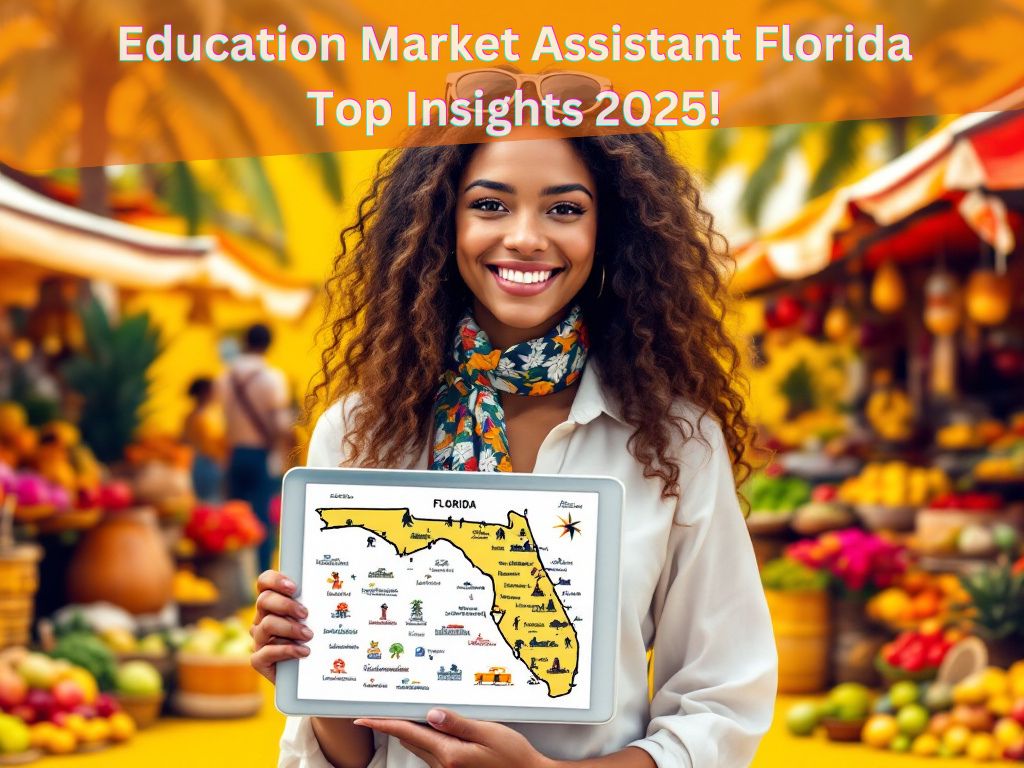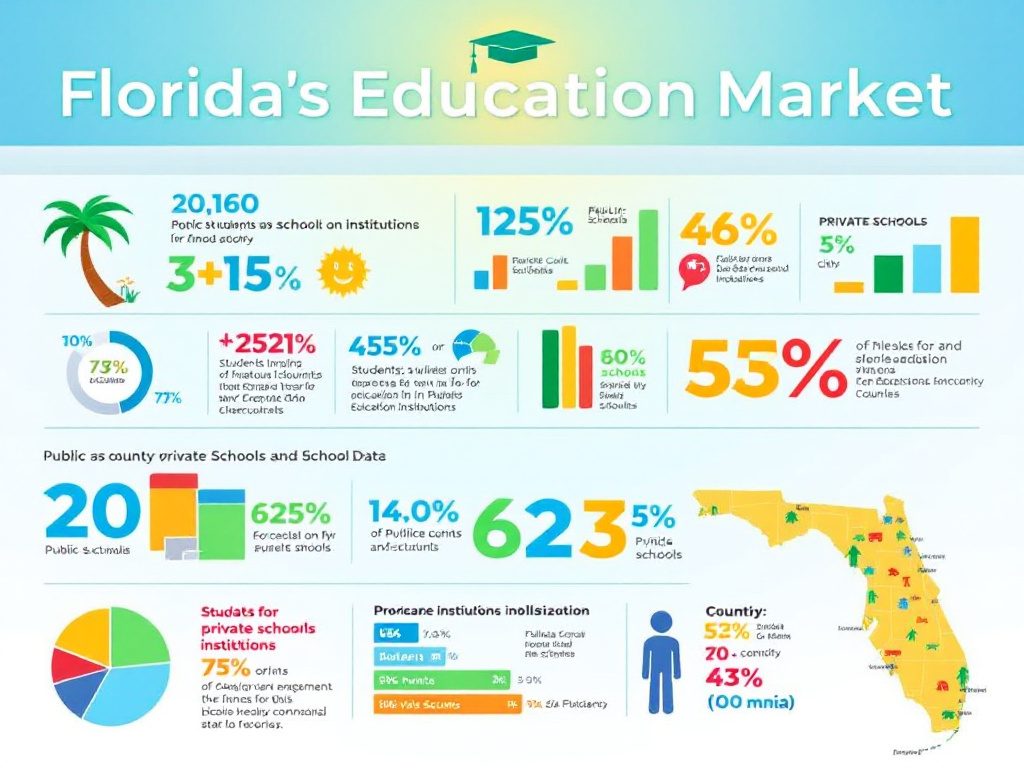Education Market Assistant Florida Top Insights

The education landscape is evolving rapidly, and staying ahead requires a blend of innovation and strategic insight. Enter Education Market Assistant Florida—a transformative solution designed to empower educators, administrators, and policymakers. In a world where knowledge is currency, understanding the intricacies of this tool can make the difference between thriving and merely surviving in the competitive educational sector.
Imagine having access to a resource that not only identifies emerging trends but also provides actionable strategies to address them. From streamlining administrative tasks to enhancing student outcomes, Education Market Assistant Florida offers unparalleled support tailored to the unique needs of Florida’s education system. Its intuitive interface and data-driven capabilities ensure that institutions can make informed decisions with confidence.
Now is the time to revolutionize the way education operates in Florida. Dive deep into the top insights that this innovative assistant has to offer and discover how it can redefine the future of learning. Whether you’re seeking to improve operational efficiency or craft better learning experiences, the journey begins here.

Florida’s Education Market
Florida’s education market is experiencing a transformative shift, driven by a blend of technological advancements and evolving educational demands. With an increasing emphasis on personalized learning, schools are integrating innovative digital tools that cater to diverse learning styles, enabling students to thrive in their unique ways. This shift not only enhances student engagement but also equips educators with real-time data to tailor their teaching strategies effectively. The rise of blended learning environments is fostering a culture where traditional classroom boundaries dissolve, allowing for more flexible and dynamic educational experiences.
Moreover, Florida’s robust investment in vocational and technical training is reshaping the landscape of higher education. As the state grapples with workforce shortages in key industries such as healthcare and technology, educational institutions are forging partnerships with local businesses to create targeted programs that align with market needs. This proactive approach not only prepares students for immediate employment but also ensures that Florida remains competitive in the global economy. As these trends continue to evolve, stakeholders must remain agile, adapting to the needs of both learners and employers to ensure a prosperous future for the Sunshine State’s education market.

Current Trends in Florida Education
Florida’s education landscape is undergoing a transformative shift, driven by technological advancements and evolving pedagogical approaches. One of the most notable trends is the integration of personalized learning models in K-12 schools. This approach tailors education to meet individual student needs, leveraging data analytics to adapt curricula in real-time. As a result, educators can better address diverse learning styles and paces, fostering a more inclusive environment that empowers every student to thrive.
Simultaneously, the rise of hybrid learning environments—combining online and in-person instruction—has gained traction, especially in response to the pandemic. Schools are investing in digital infrastructure and training teachers to navigate this dual format effectively. This trend not only enhances accessibility for students across various regions but also prepares them for a future where digital literacy is paramount. Moreover, Florida’s emphasis on STEM education continues to grow, with initiatives aimed at increasing student engagement in science and technology fields. By connecting classroom learning with real-world applications, educators are inspiring the next generation of innovators and problem solvers in the Sunshine State.
Key Players in the Education Sector
In the dynamic landscape of Florida’s education sector, several key players are shaping the future of learning. State agencies like the Florida Department of Education play a pivotal role in setting policies and standards that influence curriculum development and funding allocations. Their initiatives often drive innovative programs aimed at improving student outcomes, particularly in underserved communities. However, it’s the collaborative efforts between public institutions and private organizations that are truly redefining educational opportunities.
Nonprofit organizations such as Teach For America and local community foundations are stepping in to bridge gaps, providing resources and support for teachers while fostering leadership among students. Meanwhile, ed-tech companies are revolutionizing the classroom experience with engaging digital tools tailored to diverse learning styles. These players not only enhance the educational experience but also empower educators to harness technology effectively, paving the way for a more inclusive and adaptable educational environment. As these key stakeholders continue to innovate and collaborate, they are collectively positioning Florida as a leader in modern education practices.
Opportunities for Educational Advancement
Florida’s educational landscape is ripe with opportunities for advancement, driven by a unique blend of innovation and accessibility. The state has become a hub for online learning platforms, allowing students from diverse backgrounds to pursue their academic goals without the constraints of traditional classroom settings. This flexibility not only accommodates working professionals but also supports lifelong learners eager to enhance their skills in an ever-evolving job market.
Moreover, Florida’s commitment to workforce development has led to partnerships between educational institutions and local industries, creating tailored programs that align with current labor market needs. Initiatives such as apprenticeships and internships provide students with hands-on experience, bridging the gap between theory and practice. As a result, learners are better prepared to transition into the workforce, equipped with both the knowledge and practical skills employers seek. With a wealth of resources at their fingertips, Floridians have unprecedented access to educational tools that can propel them toward success in their chosen fields.
Challenges Facing Educators in Florida
Florida educators are navigating a complex landscape characterized by rapid demographic changes and evolving educational standards. One significant challenge is addressing the diverse needs of a multicultural student body. With a large influx of students from various backgrounds, teachers must adapt their curricula to be inclusive and culturally relevant while simultaneously meeting state-mandated benchmarks. This balancing act can lead to feelings of isolation among educators who may lack adequate training or resources to effectively engage all learners.
Additionally, Florida’s education system faces increasing pressure from legislative changes and funding disparities. As policies shift, teachers often find themselves adapting to new requirements with limited support, leading to burnout and job dissatisfaction. The struggle for fair compensation further complicates the situation, as many educators feel undervalued despite their critical role in shaping future generations. Ultimately, these challenges highlight the urgent need for comprehensive support systems that empower teachers to thrive, ensuring that Florida’s educational landscape remains vibrant and effective for all students.
Technology’s Impact on Learning Environments
The integration of technology in learning environments has revolutionized the way students engage with content, collaborate with peers, and interact with educators. With tools like virtual reality (VR) and augmented reality (AR), learners can immerse themselves in experiences that transcend traditional classroom boundaries, making abstract concepts tangible and relatable. For instance, a history lesson can transform into a virtual tour of ancient civilizations, allowing students to explore the ruins of Pompeii or walk through the streets of medieval London, fostering deeper understanding and retention.
Moreover, data analytics plays a pivotal role in personalizing education. By harnessing learning management systems (LMS) that track student progress in real-time, educators can tailor their approaches to meet individual needs. This shift from a one-size-fits-all model to personalized learning pathways not only enhances student engagement but also empowers educators to identify and address challenges proactively. As technology continues to evolve, so too does the potential for creating dynamic and adaptive learning environments that cater to diverse learning styles, ultimately preparing students for a future that demands flexibility and innovation.
Community Engagement in Education Initiatives
Community engagement in education initiatives serves as a powerful catalyst for transforming learning environments. By fostering partnerships between schools, local businesses, and community organizations, educational institutions can create a rich tapestry of resources and support that enhances student experiences. These collaborations not only provide students with real-world applications of their studies but also cultivate a sense of belonging and responsibility within the community. When students see their learning reflected in local contexts, they are more likely to be motivated and invested in their education.
Moreover, actively involving parents and community members in educational decision-making processes can lead to more relevant curricula that address the unique needs of the community. This inclusive approach encourages diverse perspectives, ensuring that educational initiatives resonate with a broader audience. By tapping into local expertise and resources, schools can implement programs that are not only innovative but also sustainable, paving the way for long-term positive outcomes. Ultimately, when communities come together to support education, they create an ecosystem where both students and residents thrive, fostering a culture of continuous learning and mutual growth.
Future Predictions for Florida’s Education Market
As Florida continues to evolve, its education market is poised for transformative changes driven by technology and demographic shifts. The rise of hybrid learning models, blending in-person and online education, is expected to gain traction, catering to a diverse student population that includes an increasing number of remote learners and international students. Educational institutions may adopt advanced analytics tools to personalize learning experiences, allowing educators to identify individual student needs and tailor curricula accordingly.
Moreover, the push for workforce readiness will redefine educational priorities. With Florida’s economy pivoting towards tech-driven industries, vocational training programs and partnerships with local businesses are likely to flourish. This collaboration will not only equip students with essential skills but also foster a stronger connection between education and employment. As the state prioritizes STEM education, initiatives aimed at increasing access for underrepresented communities could reshape the demographic landscape of Florida’s workforce, ensuring that future generations are prepared for the challenges of a rapidly changing job market.
Navigating Florida’s Educational Landscape
Florida’s educational landscape is a vibrant tapestry woven from diverse influences, making it essential for stakeholders to adapt and innovate continually. With a rapidly growing population and an influx of families seeking quality education, the demand for personalized learning experiences has never been higher. This trend is prompting schools and educational institutions to embrace technology, integrating tools like artificial intelligence and virtual reality into their curriculums. Such advancements not only enhance student engagement but also prepare them for a future defined by digital fluency.
Moreover, Florida’s commitment to educational choice—evident through its robust charter school system and scholarship programs—offers families the flexibility to select options that best suit their children’s needs. This dynamic environment encourages healthy competition among schools, driving them to elevate their standards and broaden their offerings. As educational leaders navigate this competitive market, they are increasingly focusing on holistic approaches that prioritize mental health and emotional well-being alongside academic excellence, recognizing that the two are deeply interconnected. By fostering environments that nurture both intellect and resilience, Florida’s educators are positioning students for success in an ever-evolving world.




